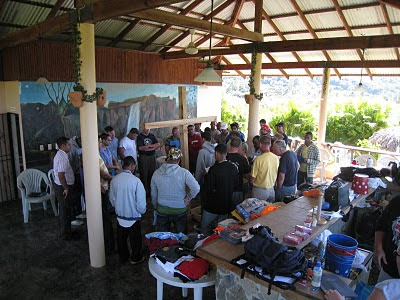We arrived Wednsesday morning in Boma after a chilly, foggy ride up and down the hills and over the river. We were met by a somber Enrique, the local church leader. He said, "I had tried to call you, but by the time I got through you had already left." (Cell phone coverage is very sketchy up in the mountains) We knew something was very wrong. Firstly, he didn't go through the normal Dominican greeting and normally the only thing that cancels our morning Bible study is rain.
"Fello died on Monday night." Enrique said.
Immediately we hugged and asked how Lina, his wife, was doing. We have blogged about Fello (real name Rafael) in the past. He has been bed-ridden for 12 years having suffered some kind of damage to his back which left him in constant pain and unable to walk, though he was not paralytic. He inspired us to look for a solar-powered audio Bible because he was not very literate and lived with out electricity, spending his days on a small foam cot propped on a couple of pillows. When he had batteries, he listened to TransWorld Radio. When he ran out of batteries, he depended on his wife to read to him or he simply prayed and meditated.
Each time we visited him, he encouraged us and Lina was sure to feed us! The hike through a creek and up a rocky path was nothing in order to spend some time with them. Fello and his wife lived off the land and depended on their son, who worked in Jarabacoa, to help them buy medicine and other necessities.
But last weekend, Fello weakened and seemed to be quite sick. Then on Sunday he rallied. Monday evening he was talking and eating Lina's delicious cooking, when he suddenly died.
Wednesday morning as we met with the leaders of the church, who are his brother and cousins, we commented that Fello is the happy one now, walking and jumping in heaven, enjoying God's presence. It is the ones who are left behind who struggle, missing him.
Fello's death breaks new ground in Boma because he is the first evangelical believer to die in the community. He expressly said he did not want the traditional 9 days of mourning. The majority of Dominicans are Catholic by tradition, though a minority are active, practicing Catholics.
When a Catholic dies here, the family observes a "velorio," 9 days of mourning with a shrine set up to the loved one in the living room. A table is set with a white table cloth, flowers, a picture of the deceased, candles and often a statue of Mary. Some wrap a cross in black cloth to represent the deceased. Everyone who knew the person stops by to visit and have some coffee. It is a very good thing for people to pay their respects and support the grieving. However, there is a lot of superstition that comes with it. By tradition the spirit is still present in the house and so water is put out under the memorial table. The rosary and other ritual prayers are said everyday for an hour to try to help ensure that the deceased will make it into heaven.
At the very end of the time, there is a special mass in the church and the next day, the family feeds everyone who shows up--and who wouldn't show up for a free meal? The family may end up feeding hundreds, or in a village it would be the entire village. This is a huge burden on the family resources, though no one would think of not doing it.
Fello and his family simply buried him and are spending extra time together to grieve. Fello and Lina's home is open to visitors, but without all the tradition. Fello's spirit isn't hanging around and his widow isn't worried about his eternal home. She knows he is in heaven because he called Jesus Lord and Savior and accepted the forgiveness of his sins that were paid for on the cross. Fello understood he was powerless to earn his way to heaven. Jesus made a way for all who would submit and follow Him.
Fello will always have a special place in our hearts.

 The men we brought were impacted. I, Rick, was impacted. While we all had different things to bring to the cross, our solution was the same --- Jesus Christ! God used this weekend and we praise Him for it!
The men we brought were impacted. I, Rick, was impacted. While we all had different things to bring to the cross, our solution was the same --- Jesus Christ! God used this weekend and we praise Him for it! 
